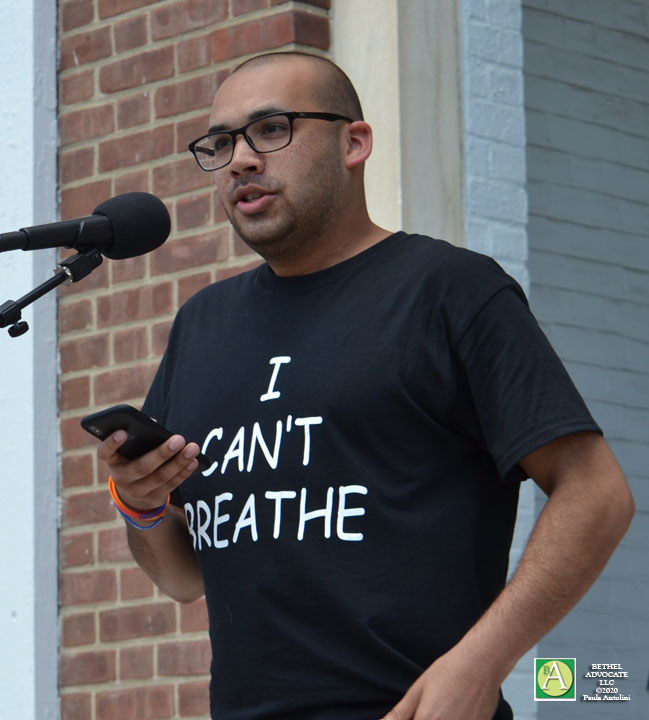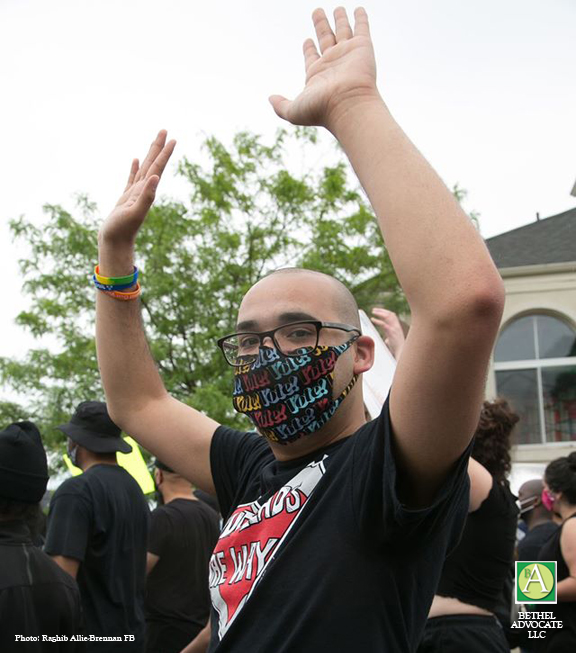
Report by Paula Antolini, July 28, 2020, 2:16PM EDT

(File photo ©2020 BETHEL ADVOCATE / Paula Antolini)
OPINION
Do you know how your CT State Representative for your district is voting on issues that concern your welfare?
Should Bethel and other communities at large, particularly police and first responders, be put at great risk with this new bill that was just passed in the house, and has a final vote looming in the senate?
In many organizations there are “bad apples” which should be removed, but does this bill go to the extreme and go overboard, making it so dangerous for law enforcement to protect the community, that many on the police force will possibly apply for early retirement, to protect their own safety, leaving the community understaffed or without many experienced professionals on the force?
Is it right for the community to be put at great risk for the wrongdoing of a few? Are statistics exaggerated? Are some news media only showing one side of the story? What do police officers really face daily? Have you walked in their shoes?
The Bethel Advocate would love to ask CT State Raghib Allie-Brennen these questions.
*****
On July 24, 2020, a vote was held on the controversial “H.B. No. 6004
Session Year 2020, “AN ACT CONCERNING POLICE ACCOUNTABILITY” and CT State Representative Raghib Allie-Brennan voted yes, to approve this controversial bill. The final House bill now goes before the State.
Allie-Brennan represents the Connecticut’s 2nd House District, including Bethel, Danbury, Redding, and Newtown, and was also a co-sponsor of this bill.
The bill in question, “HB–6004, An Act Concerning Police Accountability,” was introduced after nationwide protests brought issues to light, by the death of George Floyd, a black man who died in police custody after a white officer was recorded kneeling on Floyd’s neck for several minutes.
The bill includes many topics regarding police actions, including many NEW sections, one that reads, “repealing qualified immunity and governmental immunity for police officers” … “Effective July 1, 2021, and applicable to any cause of action arising from an incident committed on or after July 1, 2021.” (Section 41 of H.B. Bill 6004).
*****
Allie-Brennan released a statement on July 24, 2020, after his yes vote, which included in part, “I have been and continue to be supportive of law enforcement and our first responders,” and also, “The majority of our local police officers do incredible work. They are heroes and a true community resource.”
Yet, Allie-Brennan ALSO states, “the bond of trust between law enforcement and many within our communities is damaged.” Allie-Brennan calls some police officers “bad actors“ who, “sully their reputation without any fear of accountability.” He describes the bill as containing,”reforms [that] will help rebuild trust among police and the communities they protect and serve.” He mentions crimes of, “false arrest, sexual assault of a detainee, or murder,” regarding police actions.
*****

Additionally, on June 7, 2020, Raghib Allie-Brennan played a large part in an “OCCUPY GREENWOOD, Black Lives Matter” protest in Bethel, leading the charge with another organizer, David Hayes, walking alongside and supporting people with protest signs that read “Defund , Disarm, Disband” [the police] and more. He wore a shirt that read, “I can’t breathe,” referring to the death of George Floyd, in a cause that believes police are responsible for Floyd’s death.
The event had no legal permit, according to Bethel Police, yet the protestors traveled down Greenwood Avenue, a state road, turned right on Library Place, turned right on School Street, to a final destination of the CJH Municipal Center lawn, where a demonstration was held. Allie-Brennan gave a speech that included, “I am the only Legislator of color in the greater Danbury area … I stand with you.”
In his speech, Allie-Brennan described the event as being, “about the innocent black men and women who we have lost to systemic institutional racism and police brutality.” He mentioned “Breonna Taylor, Eric Garner, Sandra Bland, Ahmaud Arbery, Michael Brown, Walter Scott, Alton Sterling, and so many others,” in relation to deaths at the hands of police, Allie-Brennan stated.
Also, during the speech Allie-Brennan referred to a post he saw on Facebook that said, “More whites are killed by cops.“ He stated, “Let me start by saying there is no excuse for the brutality being inflicted on our black brothers and sisters by some of those charged with protecting us.“
“We can no longer ignore the fact that in 2019, of the 1098 people killed in encounters with police, 24% were black people despite it only being 13% of the population,” Allie-Brennan said, “And black people are three times as likely to get killed than white people. This is what we mean when we say Black Lives Matter.”
Yet Rahib Allie -Brennan is still saying he “supports the police,” but he voted YES on HB 6004.
*****
Here is Raghib Allie-Brennan’s statement in full, from July 24, 2020, about H.B. No. 6004 Session Year 2020, “AN ACT CONCERNING POLICE ACCOUNTABILITY“:
“This morning the Connecticut General Assembly voted on an Act Concerning Police Accountability.
“Over the last several weeks, the issue of police accountability and the ways in which law enforcement engages with communities – particularly communities of color – has been at the front of our national conscience. The ways in which we respond now will resonate for years to come.
“I have been and continue to be supportive of law enforcement and our first responders. In considering the issues we now face, I had extensive conversations with friends in law enforcement, as well as law enforcement leadership in Bethel, Danbury, Redding, and Newtown. I also met with and listened to members of the community.
“A thread consistent through every conversation is the bond of trust between law enforcement and many within our communities is damaged, but not unrepairable. Restoring that bond – on both sides – is critical, and we must take steps to help make that happen.
“The majority of our local police officers do incredible work. They are heroes and a true community resource. What Connecticut needs is reform that will ensure a small number of bad actors can’t discredit the good work done by the majority of our police officers.
“The bill in question includes several reforms, such as requiring implicit bias training, penalties for falsely reporting an incident, requiring body and dashboard cameras, and establishing a duty to intervene. These vital reforms will help rebuild trust among police and the communities they protect and serve.
“In response to concerns from law enforcement, I helped remove a section regarding whether police officers ought to work road construction sites — an assignment that pays overtime. One of the provisions that has generated the most interest concerns qualified immunity.
“At the federal level, the qualified immunity doctrine means that a police officer can only be held accountable for violating someone’s constitutional rights if they have violated “clearly established” case law, even in situations where an officer acted with malice. And yes, qualified immunity even protects a law enforcement official if that individual intentionally violates the law, shielding the bad actor from appropriate accountability. Establishing the power of accountability, which all of us are otherwise subject to and the existence of consequences for egregiously bad behavior, is critical to repairing the bond of trust between law enforcement and our communities.
“Some law enforcement officials are concerned that if qualified immunity is removed, police officers may fail to act as otherwise necessary for fear of being sued. I heard those voices and have worked with my colleagues to include language in the bill that clarifies and amends this section to address these serious concerns, which I share.
“What this bill will do is create a new cause of action for a victim or victim’s family to sue when someone abuses their position as a law enforcement official. The courts will still dismiss frivolous lawsuits from the outset. The offenses that trigger the limits on qualified immunity must be deliberate and extremely serious – such as false arrest, sexual assault of a detainee, or murder. Responding to law enforcement concerns and to allow room for any adjustments, I have also fought to have this section be enacted July 1, 2021 and applicable to any cause of action arising from an incident committed on or after July 1, 2021.
“This vote is a difficult decision, but leadership requires that we sometimes do the right thing, even, or especially, when it’s unpopular or misunderstood. I care too much about the good men and women of our local law enforcement to let bad actors sully their reputation without any fear of accountability.
“That is why I voted in favor of today’s bill. As a nation and as a community, we must heal. This is a step towards that healing.”
*****
Here are some of the other topics included in the H.B. 6004 bill:
- changes to police training; certification;
- added urinalysis drug test that screens for controlled substances;
- accreditation standards for the administration and management of law enforcement units; requirements that all police officers undergo periodic behavioral health assessments;
- the process for selecting psychiatrists and psychologists to conduct such assessment;
- financial considerations that may be incurred by law enforcement units or police officers;
- procedures when and officer is found to be using physical force on another person in a manner that is excessive or used physical force in a manner found to not be justifiable after an investigation is conducted;
- disciplinary matters or alleged misconduct;
- recruiting, retaining and promoting minority police officers;
- the merits and feasibility of requiring police officers to procure and maintain professional liability insurance as a condition of employment; the merits and feasibility of requiring a municipality to maintain professional liability insurance on behalf of its police officers;
- the establishment of a requirement in the general statutes that any police traffic stop be based on the enforcement of a primary traffic violation;
- how a police officer executes a warrant to enter a residence without giving audible notice of the police officer’s presence, authority and purpose before entering in this state and under the laws of other states, including verification procedures of the address where the warrant is to be executed and any documentation that a police officer should leave for the residents where the warrant was executed;
- rules for usage of body-worn recording equipment or dashboard cameras; guidelines pertaining to the use of body-worn recording equipment and dashboard cameras, including the type of detective work an officer might engage in that should not be recorded;
- timeframes for storage of recorded footage;
- search warrants and consent to search properties;
- female suspects only being searched by female law enforcement officials (policewoman) or other woman assisting in the service of the warrant, or by a woman designated by the judge or judge trial referee issuing the warrant;
- use of deadly physical force;
- unreasonable, excessive or illegal use of force, intervening and attempting to stop such other police officer from using such force;
- any correction officer who fails to intervene in such an incident may be prosecuted and punished in accordance with the 2001 provisions of section 53a-8 of the general statutes for the same acts as the correction officer who used unreasonable, excessive or illegal force;
- minimum standards and practices shall be based upon standards established by the International Association of Chiefs of Police and the Commission on Accreditation for Law Enforcement Agencies, Inc., and shall include, but need not be limited to, standards and practices regarding bias-based policing, use of force, response to crimes of family violence, use of body-worn recording equipment, complaints that allege misconduct by police officers, use of electronic defense weapons, eyewitness identification procedures, notifications in death and related events and pursuits by police officers.
- on and after January 1, 2025, each law enforcement unit shall obtain and maintain accreditation by the Commission on Accreditation for Law Enforcement Agencies, Inc. If a law enforcement unit fails to obtain or maintain such accreditation, the council shall work with the law enforcement unit to obtain and maintain such accreditation.
- the office of the Governor and the Commissioner of Emergency Services and Public Protection shall notify the joint standing committees of the General Assembly having cognizance of matters relating to the judiciary and public safety of *controlled equipment that is ordered to be sold, transferred or otherwise disposed of pursuant to subdivision (1) of this subsection.
- No law enforcement agency that is permitted to retain *controlled equipment may use any such equipment for crowd management or intimidation tactics.
- on and after the effective date of this section, no law enforcement agency may acquire controlled equipment.
*CONTROLLED EQUIPMENT: “Controlled equipment” means military designed equipment classified by the United States Department of Defense as part of the federal 1033 program that is (A) a controlled firearm, ammunition, bayonet, grenade launcher, grenade, including stun and flash-bang, or an explosive, (B) a controlled vehicle, highly mobile multi-wheeled vehicle, mine-resistant ambush-protected vehicle, truck, truck dump, truck utility or truck carryall, (C) a drone that is armored or weaponized, (D) controlled aircraft that is combat configured or combat coded or has no established commercial flight application, (E) a silencer, (F) a long-range acoustic device, or (G) an item in the federal supply class of banned items.
*****
Allie-Brennan also promoted a Danbury event which he also participated in, “The Walk for the Change You Want to See” on June 6, 2020, which also illegally blocked the I-84 highway at one point.

“The Walk for the Change You Want to See” on June 6, 2020,
which also illegally blocked the I-84 highway.
*****
On June 3rd, Allie-Brennan voiced his displeasure with First Selectman Matthew Knickerbocker right after Knickerbocker cancelled a vigil to honor George Floyd, due to safety factors of the COVID-19 quarantine.
Allie-Brennan stated, “I am truly disappointed by the decision to cancel the June 4 vigil in Bethel.”
Knickerbocker cancelled the vigil on June 3rd, the day before the event was scheduled to take place on June 4th on the CJH Municipal Center lawn, and after some graffiti had been discovered in the town gazebo and on the brick wall on the side of the municipal building that read “BLM” and other words supporting the Black Lives matter movement. Police never found the suspect(s).
The vigil or protest illegally took place anyway that night, on the corner of the Bethel Public Library, and both Allie-Brennan and Knickerbocker attended. Basically Knickerbocker went against his own words and Allie-Brennan defiantly went against Knickerbocker’s words, on an event that was originally hosted and promoted by the two of them.
What is happening here? Mixed signals once more.
*****
So who is Raghib Allie-Brennan, in actuality?
Age 29, Democrat, elected in Nov. 2018, is he really representing all his constituents viewpoints equally and fairly, as a CT State Representative, and spending his time on issues important to the majority of citizens, or does he have his own specific narrow hidden agenda, not so hidden any longer?
Perhaps you need to write to him and ask. Email him here: [email protected]
*****
This really is not centered on politics, race or even sexual orientation. It concerns character and judgement and maturity and knowing what it takes to properly represent ALL the people of Bethel and ALL the people in other towns in his district, on issues of concern to the majority of citizens, and the priority of those issues.
Isn’t this what Allie-Brennan promised to do for citizens during his last campaign?
Raghib Allie-Brennan needs to decide who he is and what the responsibility of holding the position of state representative really means.
Is he the man that was elected to represent ALL people in Bethel and ALL the people of other towns included in his districts? Or is he spending most of his time on a personal agenda, once he got into office?
###
